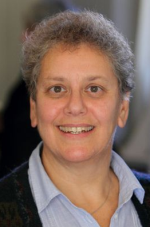January 11, 2018 at 12:00 pm
Presenter: Linda Snell, MD, MHPE, FRCPC, MACP
 Linda Snell MD MHPE FRCPC MACP, is a Professor of Medicine and a Core Faculty member, Centre for Medical Education, McGill University, and Senior Clinician Educator at the Royal College of Physicians and Surgeons of Canada. She is active in teaching, education leadership and education research at all levels of medical training. She has served in numerous education and clinical leadership roles at McGill, the RCPSC, nationally and internationally. Her current interests include: faculty development for competency-based education; advanced training for clinician-educators; learning, teaching & assessing the CanMEDS competencies, in particular the Roles of Professional, Leader and Scholar (teacher); leadership in medical education; and education scholarship. She has received teaching and education awards, and presented workshops and invited lectures across Canada and internationally. Dr. Snell has a busy internal medicine practice.
Linda Snell MD MHPE FRCPC MACP, is a Professor of Medicine and a Core Faculty member, Centre for Medical Education, McGill University, and Senior Clinician Educator at the Royal College of Physicians and Surgeons of Canada. She is active in teaching, education leadership and education research at all levels of medical training. She has served in numerous education and clinical leadership roles at McGill, the RCPSC, nationally and internationally. Her current interests include: faculty development for competency-based education; advanced training for clinician-educators; learning, teaching & assessing the CanMEDS competencies, in particular the Roles of Professional, Leader and Scholar (teacher); leadership in medical education; and education scholarship. She has received teaching and education awards, and presented workshops and invited lectures across Canada and internationally. Dr. Snell has a busy internal medicine practice.
This webinar will lay the foundation for future sessions in this series. We will discuss the definition and define the common terms that are used in competency-based medical education (CBME). The reasons for why we need to change our current education system, and how CBME may address these, will be discussed. We will describe the five components of CBME and models for implementing this new education paradigm across the continuum of medical education.
 Linda Snell MD MHPE FRCPC MACP, is a Professor of Medicine and a Core Faculty member, Centre for Medical Education, McGill University, and Senior Clinician Educator at the Royal College of Physicians and Surgeons of Canada. She is active in teaching, education leadership and education research at all levels of medical training. She has served in numerous education and clinical leadership roles at McGill, the RCPSC, nationally and internationally. Her current interests include: faculty development for competency-based education; advanced training for clinician-educators; learning, teaching & assessing the CanMEDS competencies, in particular the Roles of Professional, Leader and Scholar (teacher); leadership in medical education; and education scholarship. She has received teaching and education awards, and presented workshops and invited lectures across Canada and internationally. Dr. Snell has a busy internal medicine practice.
Linda Snell MD MHPE FRCPC MACP, is a Professor of Medicine and a Core Faculty member, Centre for Medical Education, McGill University, and Senior Clinician Educator at the Royal College of Physicians and Surgeons of Canada. She is active in teaching, education leadership and education research at all levels of medical training. She has served in numerous education and clinical leadership roles at McGill, the RCPSC, nationally and internationally. Her current interests include: faculty development for competency-based education; advanced training for clinician-educators; learning, teaching & assessing the CanMEDS competencies, in particular the Roles of Professional, Leader and Scholar (teacher); leadership in medical education; and education scholarship. She has received teaching and education awards, and presented workshops and invited lectures across Canada and internationally. Dr. Snell has a busy internal medicine practice. Kimberly D. Lomis, MD is Associate Dean for Undergraduate Medical Education, Professor of Surgery, and Professor of Medical Education and Administration at Vanderbilt University School of Medicine. She was charged with the implementation of a major revision of the medical school curriculum, “Curriculum 2.0.” Dr. Lomis also serves in the AAMC as the Associate Project Director for the national pilot of the Core EPAs for Entering Residency, and she is the past chair of the Section on Undergraduate Medical Education and prior steering committee member for the AAMC Group on Educational Affairs. In the AMA Accelerating Change in Medical Education consortium, Dr Lomis is a PI and a co-leader of the competency-based assessment group.
Kimberly D. Lomis, MD is Associate Dean for Undergraduate Medical Education, Professor of Surgery, and Professor of Medical Education and Administration at Vanderbilt University School of Medicine. She was charged with the implementation of a major revision of the medical school curriculum, “Curriculum 2.0.” Dr. Lomis also serves in the AAMC as the Associate Project Director for the national pilot of the Core EPAs for Entering Residency, and she is the past chair of the Section on Undergraduate Medical Education and prior steering committee member for the AAMC Group on Educational Affairs. In the AMA Accelerating Change in Medical Education consortium, Dr Lomis is a PI and a co-leader of the competency-based assessment group. Nicole N. Woods, PhD is Director of The Centre for Ambulatory Care Education (CACE), at Women’s College Hospital and Associate Director of the Wilson Centre, Faculty of Medicine, University of Toronto at University Health Network. Dr. Woods joined the University of Toronto in 2006 and leads a successful program of research in health professions education. A cognitive psychologist by training, her work focuses on the role of biomedical knowledge in clinical reasoning and the value of basic science training in the development of medical expertise. Dr. Woods is currently Associate Professor in the Department of Family and Community Medicine and an Education Scientist in the Office of Education Scholarship.
Nicole N. Woods, PhD is Director of The Centre for Ambulatory Care Education (CACE), at Women’s College Hospital and Associate Director of the Wilson Centre, Faculty of Medicine, University of Toronto at University Health Network. Dr. Woods joined the University of Toronto in 2006 and leads a successful program of research in health professions education. A cognitive psychologist by training, her work focuses on the role of biomedical knowledge in clinical reasoning and the value of basic science training in the development of medical expertise. Dr. Woods is currently Associate Professor in the Department of Family and Community Medicine and an Education Scientist in the Office of Education Scholarship. Molly Cooke, MD, MACP, is professor of medicine at the University of California, San Francisco. Her academic focus is health professions education with a particular emphasis on educational initiatives addressing patient outcomes and cost of care in complex, chronically ill patients. Her papers have been published in the New England Journal of Medicine, the Annals of Internal Medicine, Academic Medicine, JAMA and Science. She is an author of Educating Physicians: A Call for Reform of Medical School and Residency (2010), winner of the PROSE award for distinction in scholarly publication in 2011. In 2006 she received the AOA Robert J. Glaser Distinguished Teacher Award, a national award given by the Association of American Medical Colleges. Dr. Cooke’s medical practice focuses on the care of patients with HIV and other chronic illnesses. In addition to her work in education, she has contributed seminal works in HIV ethics during the early years of the epidemic. She has presented before two Congressional committees, consulted for the American Medical Association, and played leadership roles in a number of national organizations including the American Board of Internal Medicine, the National Board of Medical Examiners, and the American College of Physicians, serving the last organization as a Regent 2008 to 2014 and President 2013-2014. Dr. Cooke was elected to the National Academy of Medicine of the National Academies, formerly known as the Institute of Medicine, in 2013.
Molly Cooke, MD, MACP, is professor of medicine at the University of California, San Francisco. Her academic focus is health professions education with a particular emphasis on educational initiatives addressing patient outcomes and cost of care in complex, chronically ill patients. Her papers have been published in the New England Journal of Medicine, the Annals of Internal Medicine, Academic Medicine, JAMA and Science. She is an author of Educating Physicians: A Call for Reform of Medical School and Residency (2010), winner of the PROSE award for distinction in scholarly publication in 2011. In 2006 she received the AOA Robert J. Glaser Distinguished Teacher Award, a national award given by the Association of American Medical Colleges. Dr. Cooke’s medical practice focuses on the care of patients with HIV and other chronic illnesses. In addition to her work in education, she has contributed seminal works in HIV ethics during the early years of the epidemic. She has presented before two Congressional committees, consulted for the American Medical Association, and played leadership roles in a number of national organizations including the American Board of Internal Medicine, the National Board of Medical Examiners, and the American College of Physicians, serving the last organization as a Regent 2008 to 2014 and President 2013-2014. Dr. Cooke was elected to the National Academy of Medicine of the National Academies, formerly known as the Institute of Medicine, in 2013. Deborah E. Powell, M.D., joined the University of Minnesota Medical School in 2002 and served as Dean of the Medical School and Assistant Vice President for Clinical Affairs until July 1, 2009. Currently she is Dean Emerita, and Professor of Laboratory Medicine and Pathology. She is certified in Anatomic Pathology by the American Board of Pathology. Dr. Powell is well-known nationally for her expertise in medical education. She currently serves as a member of the Board of Advisors of Tufts University School of Medicine and of the Geisinger-Commonwealth Medical School and as Vice- Chair of the Senior Fellows Group of the Association of Pathology Chairs. She is an Associate Editor for Human Pathology. She recently served as a member of the LCME Council , the Advisory Council of the National Center for Complementary and Alternative Medicine and the Department of Education’s National Committee on Foreign Medical Education and Accreditation.. In 2013 she received the Abraham Flexner Award for Distinguished Service to Medical Education from the AAMC. She was elected to membership in the National Academy of Medicine in 2000.
Deborah E. Powell, M.D., joined the University of Minnesota Medical School in 2002 and served as Dean of the Medical School and Assistant Vice President for Clinical Affairs until July 1, 2009. Currently she is Dean Emerita, and Professor of Laboratory Medicine and Pathology. She is certified in Anatomic Pathology by the American Board of Pathology. Dr. Powell is well-known nationally for her expertise in medical education. She currently serves as a member of the Board of Advisors of Tufts University School of Medicine and of the Geisinger-Commonwealth Medical School and as Vice- Chair of the Senior Fellows Group of the Association of Pathology Chairs. She is an Associate Editor for Human Pathology. She recently served as a member of the LCME Council , the Advisory Council of the National Center for Complementary and Alternative Medicine and the Department of Education’s National Committee on Foreign Medical Education and Accreditation.. In 2013 she received the Abraham Flexner Award for Distinguished Service to Medical Education from the AAMC. She was elected to membership in the National Academy of Medicine in 2000.